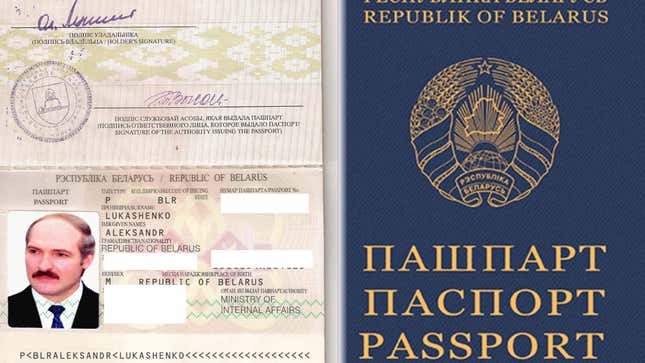
An eastern European hacktivist group claims to have hacked the passport information of every single person in Belarus, including its autocratic leader, Alexander Lukashenko, who has referred to himself as the “last dictator of Europe.” After allegedly stealing the data last summer, the gang, the Belarusian Cyber Partisans, minted several of the passports as NFTs—including Lukashenko’s—and offered them for sale on the crypto marketplace OpenSea earlier this week. The gang, which is believed to be made up of anonymous Belarusian tech experts, has declared digital war against the Lukashenko regime, which it deems corrupt and illegitimate.
“For the 1st time in human history a #hacktivist collective obtained passport info of the ALL country’s citizens. Now we’re offering you an opportunity to become a part of this history. Get a unique digital version of #lukashenka passport as #NFT,” the hackers tweeted on Tuesday. The passports are actually “mockups,” the Partisans told CyberScoop, and do not represent the original imagery of the real passports.
The same day that they went up, OpenSea took down the offerings, later telling Gizmodo that the crypto assets had broken its policy around “doxxing.” A company spokesperson explained:
“OpenSea’s Terms of Service prohibit doxxing and revealing personal identifying information about another person without their consent. We enforce our policy in various ways, including disabling buying and selling on violating content, delisting, and in some instances, banning accounts — as was the case in this instance.”
It is unclear whether the data are legitimate or not. Yuliana Shemetovets, a spokesperson for the hacker collective, told Gizmodo that “the hack of the Ministry of Internal Affairs (where the passport info was) happened in July 2021. The data used in these NFTs are from that passport database.”
The country’s Ministry of Internal Affairs has been the subject of numerous hacking episodes, including at least one incident involving the Cyber Partisans that occurred last July. During that incident, the Partisans claim to have hacked an immense wealth of internal data from the government, and subsequently began leaking portions of it to the press. The contents of the data were never verified, but they also were never contested by Belarusian authorities. Gizmodo tried to reach out to the Ministry for comment on this latest incident, but its website appeared unresponsive, and we were unable to track down a press email.
The Cyber Partisans have been stirring up trouble for the Lukashenko regime for the past several years. The gang says a number of its hacks have targeted government agencies inside Belarus, including a campaign that began last November and targeted the country’s Academy of Public Administration. In January, the gang also claimed to have carried out a ransomware attack against the Belarusian railway system. “The goal was to disrupt the work of freight trains in the hope it will affect indirectly Russian troops using the railroad to carry weapons and equipment to the Ukrainian border,” Shemetovets told Gizmodo at the time. The supposed cyberattack, while intriguing to journalists and spectators, was never ultimately verified by outside sources.